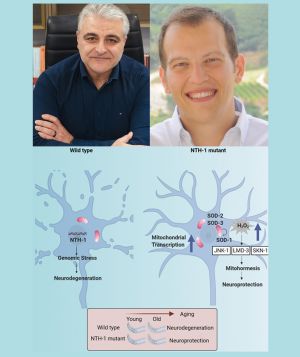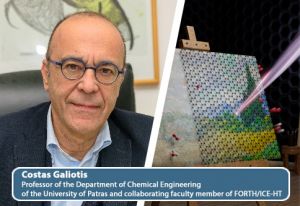All Science News
Experimental campaign of atmospheric measurements in the framework of the Cloud-AerosoL InteractionS program in the Helmos background TropOsphere (CALISHTO)
The Cloud-AerosoL InteractionS measurement campaign in the Helmos background TropOsphere (CALISHTO) is taking place in the next two months (October-November 2021) in the context of PANACEA infrastructure and the ERC program PyroTRACH.
"Hello World!" : The first test chip of the European RISC-V Processor came to life in Heraklion, Crete
Scientists uncover the role of DNA base excision repair in the pathogenesis of Parkinsonʼs disease
The findings of the study, published today in the premier international scientific journal Cell Reports, reveal a novel molecular mechanism underlying the detrimental effects of BER imbalance in the pathogenesis of Parkinson’s disease.
The incorporation of centimetre-size monolayer graphene in polymer nanolaminate is paving the way for the development of effective electromagnetic interference (EMI) shields
Since its isolation in 2004 by Geim and Novoselov from the University of Manchester (Nobel Prize in Physics in 2010), graphene has been termed as a ‘wonder material’ due to its exceptional properties that have already been exploited in many applications and products.
Cardiotoxicity, as a side effect of breast cancer treatment, at the heart of a new European research project
The new European research project CARDIOCARE, will focus on the management of the elderly multimorbid patients with breast cancer therapy-induced cardiac toxicity.
Atmospheric acidity impacts oceanic ecology
Increased acidity in the atmosphere is disrupting the ecological balance of the oceans, according to new research led by the University of East Anglia (UEA).
The pioneering idea of using graphene for the protection of paintings, paving the way for the development of novel methods in art preservation and restoration, has been published on 1.7.21, in Nature Nanotechnology.
A team of researchers from the Institute of Chemical Engineering Sciences of Foundation for Research and Technology-Hellas (FORTH/ ICE-HT), the Department of Chemical Engineering of the University of Patras, and the Center for Colloid and Surface Science (CSGI) of the University of Florence, led by Professor Costas Galiotis, had the innovative ideato use graphene veils for the protection of paintings against environmental degradation.
Less metals, more X-rays!
A recent article published in the Monthly Notices of the Royal Astronomical Society, led by Dr. Kostas Kouroumpatzakis, of the Institute of Astrophysics at the Foundation for Research and Technology, Hellas (IA-FORTH), and the University of Crete, provides new insights into the connection between the X-ray luminosity of accreting black holes and neutron stars and the composition of the stellar populations they are associated with.
Discovery of a new Protein, playing a key role in cell function, paves the way for new therapies
Research carried out at the Institute of Molecular Biology and Biotechnology-FORTH and published today in Nature Communications provides evidence that the XAB2 protein functionally links persistent DNA damage with the core spliceosome and the processing of R-loops, highlighting the functional links between genome maintenance and the splicing machinery in development or disease.
A new Research Program at FORTH aims to develop novel therapeutic strategies against Parkinson's disease
Page:1 .... 34567891011 | < Prev Next >


















